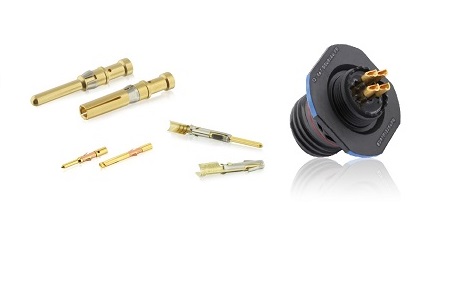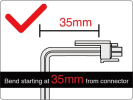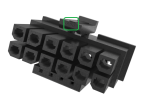Install the app
How to install the app on iOS
Follow along with the video below to see how to install our site as a web app on your home screen.
Note: This feature may not be available in some browsers.
You are using an out of date browser. It may not display this or other websites correctly.
You should upgrade or use an alternative browser.
You should upgrade or use an alternative browser.
Nvidia GeForce RTX 4090 Reviews
- Thread starter DavidGraham
- Start date
I've got a fire extinguisher ready. There's no pressure on the cable at all, it just sags a bit. I've checked the pins and they seem completely fine so I'm willing to take the risk over losing my sanity for a power cableSo all the way up to about there should be completely straight with no leaning right, left, up, or down according to the CableMod guidance.
View attachment 7390

I've got a fire extinguisher ready. There's no pressure on the cable at all, it just sags a bit. I've checked the pins and they seem completely fine so I'm willing to take the risk over losing my sanity for a power cable
Maybe get some Audiophile Suspension Ties to keep the cables lifted...
The fact that there doesn't appear to be any mechanical strain relief either,Four 14 gauge wires soldered to tinfoil is a recipe for disaster, this was a totally avoidable issue and the people who designed/made that connector should be held accountable and if I had my way punished by being lashed severely with a wet noodle of shame!
View attachment 7380
Yeesh, from an electrical/mechanical engineering perspective that's a masterclass in how *not* to do it.Four 14 gauge wires soldered to tinfoil is a recipe for disaster, this was a totally avoidable issue and the people who designed/made that connector should be held accountable and if I had my way punished by being lashed severely with a wet noodle of shame!
View attachment 7380
Solder is not glue, and a joint that will experience any mechanical stress, bending or vibration that is attached that way can be expected to fail.
I wouldn't be shocked if these progressively got worse as they age and are uninstalled/reinstalled, bent back and forth, etc. Lead-free solder (which this presumably is) only makes the situation worse, as it work hardens, fatigues and cracks with mechanical and thermal cycles.
For something like that you'd want to make a solid mechanical connection first and then solder afterward. They make terminals/receptacles with proper 180 degree or 360 degree wrap around the wire so you get a lot more surface area for the solder and a much more reliable mechanical connection... but I don't know why they aren't used here.
Solder Cup Connectors and Terminal Pins | Mill-Max Mfg. Corp.

Choosing Contacts: Solder vs Crimp? | SOURIAU SUNBANK Connection Technologies
Choosing the right contacts is not always easy, especially if you do not have engineers specialized in interconnect designs. The quick answer to the
When I'm making automotive/racing wiring harnesses, I always both crimp and solder for mostly the best of both worlds. You get the mechanical robustness and strain relief of the crimp connection, along with the hermetic seal, corrosion resistance, and lower overall series resistance of the solder.
For the same reasons, if you ever look at an OEM wire-to-battery-terminal connection on a car that carries hundreds of amps to the starter, it's almost certainly going to be crimped for the mechanical reliability.
Great photos, you can also easily see the difference in the actual pin terminals in the Nvidia provided one, notice how they have a split on both top and bottom, versus the other two have only one split at the top. Over and above the horrible connection of the wires, I would much prefer the mechanical rigidity of the two non-Nvidia ones.Since I have 3 different 12+4 pin cables might as well compare them...

 Now I'm no cable engineer but one looks different than the other ones
Now I'm no cable engineer but one looks different than the other ones

Amphenol makes these terminals in about a dozen different permutations, both low insertion force (I suspect what the Nvidia adapter is using, given its seams top and bottom) and the regular kind, along with a wide array of electroplating options and even the alloy used for the body of the terminal.
Every manufacturer of every product hates stocking more SKUs than they need to, so there has to be some sort of penalty you pay for the 'Low Insertion Force' version or that'd be the only one they make, be that lower mechanical durability/rigidity, slightly higher contact resistance, etc.
You need the specific fancy (and presumably more expensive) cupronickel terminal body alloy it looks like for the terminal to be rated as the 'high current' version too, as 3rd party versions of these get pumped out by the tens of thousands and show up on AliExpress, I highly suspect they're going to be using whatever is bottom of the barrel and cheapest, regardless of what the spec calls for:
'Regular' terminal: https://cdn.amphenol-cs.com/media/wysiwyg/files/drawing/10132447.pdf
'Low Insertion Force' terminal: https://cdn.amphenol-cs.com/media/wysiwyg/files/drawing/10134160.pdf
Rootax
Veteran
Maybe they should start using external power bricks with simple industrial plugs for these beasty products?
Voodoo 5 6000 style.
Yeah, for whopping 60W max consumption. 10xVoodooVolts it is!Voodoo 5 6000 style.
One other fun thing I found while reading through all of Amphenol's documentation - genuine Amphenol 12HPWR housings will all have 'H+' molded into the body and a tiny 'APH' molded into the tip of the retention clip:
May help evaluating 3rd party 12HPWR -> 3x/4x PCIe adapters if you're interested to see if they're constructed with the 'reference spec' name brand Amphenol connectors versus other 3rd party 'compatible' alternatives.
May help evaluating 3rd party 12HPWR -> 3x/4x PCIe adapters if you're interested to see if they're constructed with the 'reference spec' name brand Amphenol connectors versus other 3rd party 'compatible' alternatives.
Attachments
NVIDIA supplies AIBs with Astron adapters, not sure what housing they useOne other fun thing I found while reading through all of Amphenol's documentation - genuine Amphenol 12HPWR housings will all have 'H+' molded into the body and a tiny 'APH' molded into the tip of the retention clip:
May help evaluating 3rd party 12HPWR -> 3x/4x PCIe adapters if you're interested to see if they're constructed with the 'reference spec' name brand Amphenol connectors versus other 3rd party 'compatible' alternatives.
ArsTechnica article around this product failure:

 arstechnica.com
arstechnica.com

Testing suggests faulty cable may be to blame for melting RTX 4090 connectors [Updated]
More reports of overheating power connectors have surfaced every day this week.
 arstechnica.com
arstechnica.com
Testing suggests faulty cable may be to blame for melting RTX 4090 connectors
More reports of overheating power connectors have surfaced every day this week.
DegustatoR
Legend
It's the same what Igor has reported previously, and it's not as much a faulty cable as a faulty adapter design in general. The wires in it shouldn't break off because reasons, it's just a bad design.

Nvidia Calls for Melted 4090 Cards to Be Returned for Analysis
Things are getting heated
Henry swagger
Newcomer
The cable gate is embarrassing fir nvidia's rep.. amd have to take advantage of this for marketing angles 

Silent_Buddha
Legend
Considering how much the cards cost, I'm incredibly surprised that NV shipped such shoddy adapters (NV supplied adapters that I'm assuming many AIBs are using) for the card. It's one thing to cheap out on adapters for budget cards, but for something that costs over 1k USD?
Regards,
SB
Regards,
SB
digitalwanderer
Legend
I'm not really holding nVidia totally responsible for this, they could have very easily have gotten ripped off by a vendor who cheaped out on them. I will grant there is a strong argument that nVidia should have checked the adapter out a whole lot better before packaging it with their 1000+ GPUs, but they could be a victim here rather than the bad guy.Considering how much the cards cost, I'm incredibly surprised that NV shipped such shoddy adapters (NV supplied adapters that I'm assuming many AIBs are using) for the card. It's one thing to cheap out on adapters for budget cards, but for something that costs over 1k USD?
Regards,
SB
I doubt it personally since I think they should have done better QC on the 3rd party stuff they include with their GPUs, but that's just my opinion. We don't know the full story yet. I very much doubt nVidia would have knowingly included such a shitty adapter with their product though. nVidia is evil, it ain't stupid.
digitalwanderer
Legend
I was wondering where Steve went and why GN hadn't chimed in yet. Excellent video as always, I love how thorough and patient Steve is!
Similar threads
- Replies
- 404
- Views
- 33K
- Replies
- 137
- Views
- 5K
- Replies
- 3
- Views
- 440
- Replies
- 7
- Views
- 3K


